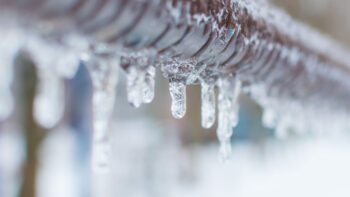
Below freezing winter temperatures can cause many problems, including icy roads, in cold climates. One of the worst potential problems for any homeowner living in a cold climate is frozen pipes. Frozen pipes create a significant increase in pressure, which can cause the pipes to burst. It is not just an inconvenient problem but also a potentially expensive one. Here are some ways to stop your pipes from freezing.
1. Open Cabinets That Conceal Water Pipes
Warm air circulation is one of the best ways to keep pipes from freezing, especially water pipes. You can open your kitchen and bathroom sink cabinet doors to help that process along. However, you need to be careful if you have pets or children. Make sure you move cleaning products usually stored in those cabinets out of their reach.
2. Keep the Water Flowing, But Only Slightly
Water pipes are much less apt to freeze when they are in use. All it takes is a small drip to help prevent freezing. You may feel reluctant because of your water bill. However, paying slightly extra to let your faucet drip for a night or two is better than the alternative, expensive mess. The best faucet to leave on is the one furthest from where the water enters the house. That way the water moves through the whole pipe system. If you do not know which faucet that is, leave all water faucets dripping on the coldest days and nights.
3. Insulate Your Home Properly
Proper insulation is vital in cold climates. It can help you reduce the chances of having your pipes freeze. Also, it can help reduce your heating and cooling costs throughout the year. There are many areas of your home that may need insulation. Here are some areas to check:
- Attic
- Crawl Space
- Basement
- Around Windows
- Exterior Wall Gaps
- Around the Pipes Themselves
4. Adjust Your Heat Accordingly
Some families opt to lower their thermostats at night. If you are expecting a cold snap, keep your thermostat set higher for the night. Similarly, you might want to turn your heat off when you leave the house, but that could cause your pipes to burst. The best rule of thumb is to not allow the temperature in your home to dip below 55 degrees Fahrenheit in the winter, even when you are not home.
Sometimes a winter temperature drop that can freeze your pipes occurs with little or no warning. You can invest in a thermostat system you can control remotely to avoid that problem. That can allow you to adjust the temperature in your home from your mobile phone on short notice. You can also do so at a distance, such as when you are on vacation.
By Admin –